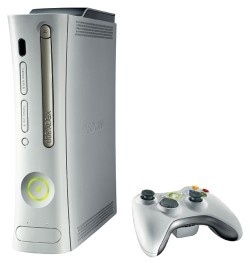
Xbox 360 and PS3 - flops instead of gigaflops?
 Anandtech first published and then pulled a rather sensationalist article which slandered processing power of the next generation gaming consoles of Sony and Microsoft. The article suggested that Anandtech had discussed with developers who had been in touch with the hardware, and therefore had first hand information. According to their sources the designs are cache crippled and exotic.
Anandtech first published and then pulled a rather sensationalist article which slandered processing power of the next generation gaming consoles of Sony and Microsoft. The article suggested that Anandtech had discussed with developers who had been in touch with the hardware, and therefore had first hand information. According to their sources the designs are cache crippled and exotic.
The most ironic bit of it all is that according to developers, if either manufacturer had decided to use an Athlon 64 or a Pentium D in their next-gen console, they would be significantly ahead of the competition in terms of CPU performance.While the original article has been removed, some of it is available at Arstechnica
While the developers we've spoken to agree that heavily multithreaded game engines are the future, that future won't really take form for another 3 - 5 years. Even Microsoft admitted to us that all developers are focusing on having, at most, one or two threads of execution for the game engine itself - not the four or six threads that the Xbox 360 was designed for... In the end, the more multithreaded nature of these new console CPUs doesn't help paint much of a brighter performance picture - multithreaded or not, game developers are not pleased with the performance of these CPUs.

 It is being reported on some news sites that some raids took place today against Internet "warez" groups. It has been confirmed so far that there was at least one arrest against a Fremont man. Chirayu Patel, 24, was arrested yesterday accused of setting up hardware and running a site for a group called Boozers; who are famous online for releasing pirated DVDR copies of movies. Apparently the FBI unmasked a number of piracy groups by making massive amounts of storage space available to them.
It is being reported on some news sites that some raids took place today against Internet "warez" groups. It has been confirmed so far that there was at least one arrest against a Fremont man. Chirayu Patel, 24, was arrested yesterday accused of setting up hardware and running a site for a group called Boozers; who are famous online for releasing pirated DVDR copies of movies. Apparently the FBI unmasked a number of piracy groups by making massive amounts of storage space available to them.
 Apple has announced that it has merged the iPod with the iPod Photo, making way for a new line of iPod players that have colour screens and the ability to view album art work, photos and slide shows aswell as listening to music. The announcement came at the same time that Apple
Apple has announced that it has merged the iPod with the iPod Photo, making way for a new line of iPod players that have colour screens and the ability to view album art work, photos and slide shows aswell as listening to music. The announcement came at the same time that Apple  It is simply advertised as a way to assist in converting your private collection of VHS and DVD originals to DVD. It also has a disclaimer that Macrovision may have forgotten to mention that reads...
It is simply advertised as a way to assist in converting your private collection of VHS and DVD originals to DVD. It also has a disclaimer that Macrovision may have forgotten to mention that reads...







